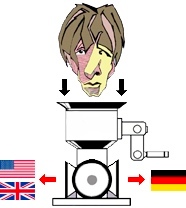Should punctuation be used at the end of mobile app strings? Autor wątku: Mark Sanderson
|
|---|
Hello,
I recently completed a case translating strings for a mobile app. One of the Chinese source strings stated:
这是一个月以上没有使用过的应用,建议卸载
which I translated as:
This app has not been used for over a month, we recommend uninstalling it.
The client has come back to me saying that my English translation shouldn't use a period at the end because the Chinese version doesn't. However, to my eyes the... See more Hello,
I recently completed a case translating strings for a mobile app. One of the Chinese source strings stated:
这是一个月以上没有使用过的应用,建议卸载
which I translated as:
This app has not been used for over a month, we recommend uninstalling it.
The client has come back to me saying that my English translation shouldn't use a period at the end because the Chinese version doesn't. However, to my eyes the sentence doesn't look complete if it has a comma in the middle but no period at the end.
I've done some Googling and found that Microsoft state: "Use ending punctuation only in instructional text." (Source: https://msdn.microsoft.com/en-us/library/bb158706.aspx)
But I then found this statement: "Don't include final periods if the instruction is a statement." here (http://ux.stackexchange.com/questions/18671/periods-at-the-end-of-a-sentence-in-alert-message)
The string above does seem to be a statement, so perhaps the period isn't required.
What would you do?
Thanks,
Mark ▲ Collapse
| | | | Jan Truper 
Niemcy
Local time: 14:55
angielski > niemiecki
| I use punctuation for German | Jul 12, 2016 |
Not sure if this helps you, but when translating mobile content into German I use punctuation marks for all whole, complete sentences (unless they are part of a list, in which case it depends on the surrounding list items; or unless otherwise instructed by the client).
| | | | Mark Sanderson 
Wielka Brytania
Local time: 13:55
chiński > angielski
NOWY TEMAT
Jan Truper wrote:
Not sure if this helps you, but when translating mobile content into German I use punctuation marks for all whole, complete sentences (unless they are part of a list, in which case it depends on the surrounding list items; or unless otherwise instructed by the client).
Hi Jan,
Yes, it looks like we are thinking along the same lines here. It seems wrong to me, but if the agency says that the final period isn't required, then it isn't required. (Although this does raise further questions about professionalism: as a professional, isn't it my job to ensure that the work is completed to standards which I think are correct? Or should I just role over and accept it?)
| | | | Jan Truper 
Niemcy
Local time: 14:55
angielski > niemiecki
| customer is king | Jul 13, 2016 |
[quote]Mark Sanderson wrote:
(Although this does raise further questions about professionalism: as a professional, isn't it my job to ensure that the work is completed to standards which I think are correct? Or should I just role over and accept it?)
You should complete the work correctly; however, the client always has the final say.
But if their wishes deviate from correct language norms, they should tell you beforehand. For example, they could have included an instruction like "Please use punctuation as per source text" or similar.
If they come back later and make you "fix" a correct text, I think it's within your right to be compensated for such work (or even to turn it down). It's your decision whether to ask for such compensation...
| | |
|
|
|
| may be right, argument is faulty | Jul 13, 2016 |
Their reasoning "no punctuation in source text = should be no punctuation in target text" is wrong and ignorant. Different languages and contexts have different conventions. However, that does not mean that their conclusion is incorrect (it could be normal to omit final punctuation in English in this context).
At the same time, "gut feelings" are also notoriously unreliable in highly conventionalized situations like this.
If you care, then find valid sources in English (= Micr... See more Their reasoning "no punctuation in source text = should be no punctuation in target text" is wrong and ignorant. Different languages and contexts have different conventions. However, that does not mean that their conclusion is incorrect (it could be normal to omit final punctuation in English in this context).
At the same time, "gut feelings" are also notoriously unreliable in highly conventionalized situations like this.
If you care, then find valid sources in English (= Microsoft and not Stackexchange) and/or ask a couple friends with English-language phones to tell you if there is a period/ full stop at the end of the messages on their phones (= use parallel texts to check conventions in context in the target language). My German Samsung uses final punctuation in the few notifications I've noticed, but that doesn't mean English does the same.
And I'm also a member of the "customer is king" camp: If you check things and their instructions contradict established conventions, you should inform them and explain how you arrived at your conclusion. If they choose to ignore this information, that is their prerogative. In many situations, they may even have a better view of a big picture in which a small error makes more sense overall.
And like Jan said, it is not your job to "fix" (= break) something if they did not inform you about this ahead of time. ▲ Collapse
| | | | Balasubramaniam L. 
Indie
Local time: 19:25
Członek ProZ.com
od 2006
angielski > hindi
+ ...
SITE LOCALIZER | Compatibility with previous usage | Jul 13, 2016 |
Since this is an application you are translating, what would be of paramount importance is internal consistency with how things have been done previously in this application. If in such sentences, end punctuation has not been used earlier, you should also not use it.
In the ideal situation, the client should have provided you with a detailed style sheet explaining how such issues are to be handled, and also access to previous translations of the application's UI strings, so that you... See more Since this is an application you are translating, what would be of paramount importance is internal consistency with how things have been done previously in this application. If in such sentences, end punctuation has not been used earlier, you should also not use it.
In the ideal situation, the client should have provided you with a detailed style sheet explaining how such issues are to be handled, and also access to previous translations of the application's UI strings, so that you could keep your translation in conformity with earlier usage.
If they did not do this, it is partly their mistake. But it was also incumbent upon you to have asked them for such references.
Linguistically speaking, there no right or wrong usage here, as it is all a matter of style and preference. Also, as others have pointed out, it also varies from language to language, market to market, and application to application. In Hindi, for example, I would use the end punctuation in such translations.
[Edited at 2016-07-13 07:35 GMT] ▲ Collapse
| | | | To report site rules violations or get help, contact a site moderator: You can also contact site staff by submitting a support request » Should punctuation be used at the end of mobile app strings? | Wordfast Pro | Translation Memory Software for Any Platform
Exclusive discount for ProZ.com users!
Save over 13% when purchasing Wordfast Pro through ProZ.com. Wordfast is the world's #1 provider of platform-independent Translation Memory software. Consistently ranked the most user-friendly and highest value
Buy now! » |
| | Trados Business Manager Lite | Create customer quotes and invoices from within Trados Studio
Trados Business Manager Lite helps to simplify and speed up some of the daily tasks, such as invoicing and reporting, associated with running your freelance translation business.
More info » |
|
| | | | X Sign in to your ProZ.com account... | | | | | |







